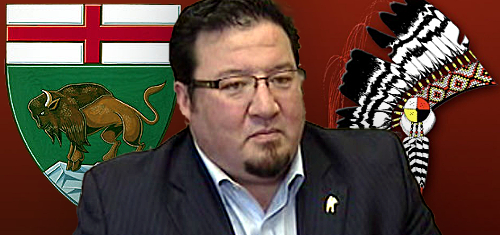 Tribal groups in the Canadian province of Manitoba are pressing for more control over gambling activity, be it land-based or online.
Tribal groups in the Canadian province of Manitoba are pressing for more control over gambling activity, be it land-based or online.
Representatives of Manitoba’s First Nations wrapped up a two-day assembly this week by authorizing the drafting of a law that will put them back in the driver’s seat and assert their right to control gambling operations.
Manitoba Grand Chief Derek Nepinak (pictured) told the Winnipeg Free Press that the new law the Assembly of Manitoba Chiefs (AMC) is drafting will encompass “the full scope of gaming, games of chance, including electronic and online gaming.” The latter would put the AMC in direct competition with the provincial lottery monopoly, which launched its own version of British Columbia’s PlayNow.com in 2013.
Nepinak said the AMC was hoping for a better relationship with the newly elected Conservative government, which won election in April, ending nearly 17 years of New Democratic Party control.
In 2005, the AMC struck a deal with the NDP to develop five First Nations-owned casinos, only three of which have actually opened to the public. A fourth casino is slated to be developed in the northern town of Thompson following the municipal government’s reversal of its earlier objections to the plan.
Nepinak said the AMC felt it was “always pushed to the side” by the NDP, which appeared to support a “two-tiered” system that gave “private, commercial and corporate interests” greater access to preferred casino sites in urban centers.
Nepinak called this “unacceptable going forward” and hoped that the new Tory government would work with the AMC to “recognize some of the flaws in the previous joint gaming table we had.”
However, while Nepinak hoped that the Tories would recognize First Nations’ “right to exercise gaming inherently,” he said the tribes would be going forward with or without the new government’s collaboration.
SASKATCHEWAN TRIBAL CASINO PROFITS RISE
Just across Manitoba’s border, the Saskatchewan Indian Gaming Authority (SIGA) reported a net profit of C$86.3m (US $67.5m) from gaming operations in the fiscal year that ended March 31. That’s 2.6% higher than the previous year, the fifth consecutive year that SIGA’s annual profits have topped $80m and just $100k shy of its all-time peak in 2012-13.
SIGA operates six First Nations casinos in the province, and recently received the provincial government’s approval to open a seventh in the city of Lloydminster (not far from where a certain Calvin Ayre grew up).
Half of SIGA’s profits go to First Nations groups, while the remainder is evenly split between the provincial government and various charities and non-profit groups.
Saskatchewan’s First Nations have flirted with online gambling in the past. In 2014, SIGA came close to signing a deal with the province that would have allowed it to offer “casino-type games through the internet” but the deal was never signed.
Independent of that deal, the White Bear First Nation’s NorthernBearCasino.com did launch but closed in 2014 due to what its principal backer described as a “very competitive” marketplace.
